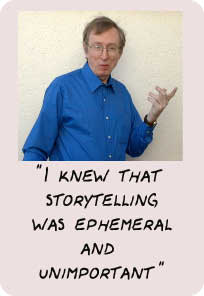|
|
Katalina Groh, Larry Prusak: Some of the world's leading thinkers |
| How we found ourselves in the world of storytelling |
 |
Steve Denning
I am a latecomer to storytelling. I grew up in Sydney Australia. My dad was very taciturn and monosyllabic. Never said very much. My mother was a bit more talkative, but not by much. I grew up being very good at analysis, at mathematics, at science, at physics. I was good at making sharp distinctions, and good at putting things into categories. Of course, I was interested in literature on the side, and read a lot of books for fun. But reading stories was for fun. Novels, plays, poetry, that was just for the pleasure of it. It was entertainment. It was ephemeral. It was subjective. It was nebulous. I knew that fundamentally, it wasn’t serious. It wasn’t solid. I knew that it wasn’t important at all. The important things were the analysis, the |
| mathematics, the quantification,
the solid things like knowledge. And these tools served me well for a several
decades.
I became a manager in the World Bank, a successful manager with large global responsibilities. Having sharp distinctions and being quick with analysis helped me to success. I was very successful in what I did. And then something different happened. About five years ago, in 1996, I found myself in a new situation where I had no hierarchical authority and where I needed to persuade the organization to make a major change. Suddenly, I found none of the stuff on which I had been relying worked any more – the analysis, the sharp distinctions, the mathematics, the quantification, the solid things like knowledge, the rational argument, the cerebral methods. None of these things seemed to work. I gave reasons to people, and they just didn’t listen. And then I stumbled on something different. I found that a certain sort of story had the power, not only to communicate a complex idea but also to launch people into rapid action. So I started using stories in my presentations, not very consciously, but simply because these were the slides that were having a positive effect on the audiences I was talking to. I kept on doing this, using stories in my presentations and then people started asking me, “How come the World Bank is moving along so rapidly in knowledge management?” And I would try to suggest various reasons – it was a good idea, it had the support of the president – but these reasons didn’t seem to persuade anyone. So finally I said one day in a presentation I was making in Charleston, North Carolina, I said rather tentatively, “Maybe it’s got something to do with storytelling?” Well, this got a hugely positive response and someone from a large publishing firm came up to me after the presentation was over, and she said, “Why don’t you write a book?” I said: “About what?” She said: “About storytelling.” “But,” I said, that’s all I know about storytelling. Maybe it’s got something to do with storytelling. That’s all I know.” “Don’t worry,” she said. “Just start writing and it will work out.” So I followed this advice and I started looking into storytelling and writing about it. And three years later, I had, much to my own astonishment, had published a book telling the story of storytelling, called The Springboard: How Storytelling Ignites Action in Knowledge-Era Organizations. |
| Books and videos on storytelling *** In Good Company : How Social Capital Makes Organizations Work by Don Cohen, Laurence Prusak (February 2001) Harvard Business School Press *** The Social Life of Information, by John Seely Brown, Paul Duguid (February 2000) Harvard Business School Press *** The Springboard : How Storytelling Ignites Action in Knowledge-Era Organizations by Stephen Denning (October 2000) Butterworth-Heinemann *** The Art of Possibility, a video with Ben and Ros Zander : Groh Publications (February 2001) |
| The views expressed on this website are those of the authors, and not necessarily those of any person or organization |
| Site optimized in 800x600: webmaster CR WEB CONSULTING |
|
|
|
|